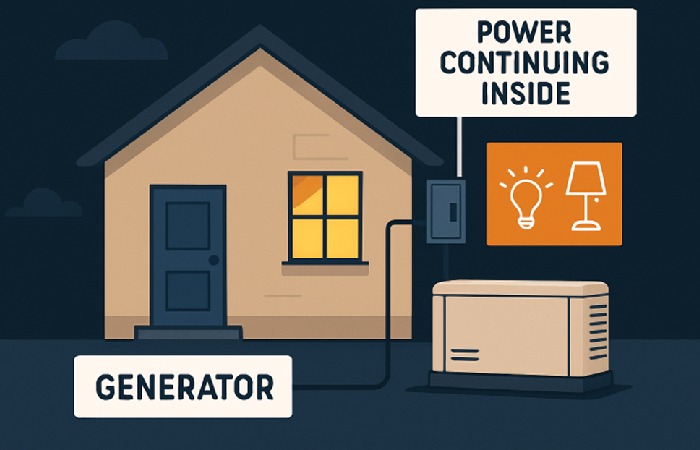Unexpected power outages can upend the comfort and safety of your household, especially when storms or unpredictable events strike. Proactively preparing your home with a whole home generator keeps your essential systems running, safeguards your family, and minimizes disruption. If you’re considering a solution to power loss, Raleigh, NC whole home generator installation by licensed electricians ensures that your installation is handled safely and professionally, providing peace of mind no matter the weather.
With severe weather and rising grid instability, more homeowners are investing in backup power. This guide explains everything in preparing your home for generator installation, with licensed electricians ensuring the process is smooth, compliant, and reliable.
Table of Contents
Assessing Your Power Needs
The first step to effective generator installation is examining the critical devices, appliances, and systems you need to keep running during an outage. List your must-haves, such as refrigerators, HVAC units, lighting, security systems, medical devices, and internet connectivity. Calculating their combined wattage or amperage gives a clear picture of your required generator size. For many homes, prioritizing only essential items helps keep costs and fuel requirements manageable.
Choosing the Right Generator
Generators come in various fuel types and sizes. Natural gas and propane are popular for whole-home systems due to their convenience and cleaner operation, while diesel is renowned for durability and extended use in more rural settings. Equipped with your power needs, compare brands, features, and noise levels. Consulting a licensed electrician for a load calculation and system compatibility check helps ensure your chosen model perfectly matches your home’s unique requirements.
Proper generator sizing prevents both underpowered and overpowered systems, maximizing energy efficiency and investment longevity. For more detailed guidance, resources such as Cummins’ home generator buying guide can offer deeper insight into comparing models and sizing options.
Selecting a Safe Installation Location
Location matters when installing a whole-home generator safely. To prevent carbon monoxide poisoning, keep the unit outside, at least five feet away from all doors, windows, and vents. The surface, such as a reinforced concrete pad, should be stable, level, and flood-resistant. Local building codes may further dictate specific distances from property lines, air conditioning units, or utility meters, so verify these requirements before placing your order. Adequate airflow and protection from inclement weather help optimize generator operation.

Understanding Permits and Regulations
Every locality has building codes and electrical regulations for generator installation. Before starting any work, obtain the appropriate permits to avoid costly setbacks or fines. Most municipalities mandate licensed electricians for all permanent generator hookups. These professionals are well-versed in code compliance and can help you navigate application paperwork, inspections, and utility notification processes. Trusting this expertise protects your investment and ensures safety for your household and neighbors.
Preparing Electrical and Fuel Systems
An assessment of your electrical panel by a professional may reveal a need for upgrades or dedicated circuits for your generator. Older panels might be inadequate for a modern generator’s load demands. The type of generator you select—natural gas, propane, or diesel—will also determine utility connections and tank placement. Installations must meet strict codes covering gas line pressure, distance from ignition sources, and secure attachment. Thoughtful planning here reduces risk and keeps your home prepared for any emergency. For more technical considerations, consult guidelines from the U.S. Department of Energy.
Scheduling Professional Installation
Whole-home generator installation is a complex job best left to licensed electricians. These experts ensure proper wiring, seamless connection to your home’s load center, and safe integration with utility power. They handle transfer switch installation to prevent electrical backfeeding, which protects utility workers and your equipment. Scheduling early, especially before storm seasons, means you’ll be ready before outages hit and ensures that all work meets safety and code requirements.
Conducting Post-Installation Tests
After your generator is in place, thorough testing checks system performance and reliability. Electricians simulate a utility outage to verify that the generator starts automatically and that essential loads transfer smoothly. This step helps detect wiring issues or generator malfunctions before an emergency occurs, giving you confidence in your backup solution’s readiness.
Maintaining Your Generator
Routine maintenance is critical to long-term reliability. Change oil and filters according to manufacturer schedules, inspect battery condition, and run regular test cycles, ideally once a month. Seasonal checks before severe weather are wise. Partnering with a local service provider for annual inspections and repairs validates your warranty and ensures your backup power is ready whenever needed.
Installing a whole-home backup generator is a forward-thinking investment that safeguards your household from unexpected power interruptions. Unlike portable units, these systems automatically restore electricity within seconds, ensuring vital appliances, lighting, and security systems remain operational. Partnering with licensed electricians ensures safe installation, proper load assessment, and compliance with local electrical codes. Careful planning—such as selecting the right generator size and fuel source—further enhances reliability and efficiency. Outages no longer need to disrupt your comfort or safety, whether caused by storms, grid failures, or maintenance shutdowns. With a professionally installed backup generator, you gain uninterrupted power, protection for sensitive electronics, and the peace of mind that your home and family remain secure and fully functional.


